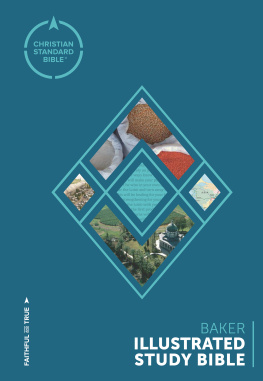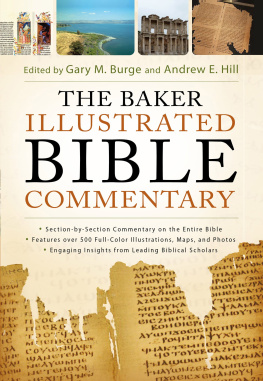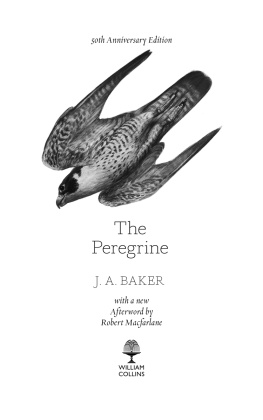J. A. Baker - The Peregrine: The Hill of Summer & Diaries: The Complete Works of J. A. Baker
Here you can read online J. A. Baker - The Peregrine: The Hill of Summer & Diaries: The Complete Works of J. A. Baker full text of the book (entire story) in english for free. Download pdf and epub, get meaning, cover and reviews about this ebook. year: 2011, publisher: William Collins, genre: Detective and thriller. Description of the work, (preface) as well as reviews are available. Best literature library LitArk.com created for fans of good reading and offers a wide selection of genres:
Romance novel
Science fiction
Adventure
Detective
Science
History
Home and family
Prose
Art
Politics
Computer
Non-fiction
Religion
Business
Children
Humor
Choose a favorite category and find really read worthwhile books. Enjoy immersion in the world of imagination, feel the emotions of the characters or learn something new for yourself, make an fascinating discovery.

- Book:The Peregrine: The Hill of Summer & Diaries: The Complete Works of J. A. Baker
- Author:
- Publisher:William Collins
- Genre:
- Year:2011
- Rating:5 / 5
- Favourites:Add to favourites
- Your mark:
- 100
- 1
- 2
- 3
- 4
- 5
The Peregrine: The Hill of Summer & Diaries: The Complete Works of J. A. Baker: summary, description and annotation
We offer to read an annotation, description, summary or preface (depends on what the author of the book "The Peregrine: The Hill of Summer & Diaries: The Complete Works of J. A. Baker" wrote himself). If you haven't found the necessary information about the book — write in the comments, we will try to find it.
J. A. Baker: author's other books
Who wrote The Peregrine: The Hill of Summer & Diaries: The Complete Works of J. A. Baker? Find out the surname, the name of the author of the book and a list of all author's works by series.
The Peregrine: The Hill of Summer & Diaries: The Complete Works of J. A. Baker — read online for free the complete book (whole text) full work
Below is the text of the book, divided by pages. System saving the place of the last page read, allows you to conveniently read the book "The Peregrine: The Hill of Summer & Diaries: The Complete Works of J. A. Baker" online for free, without having to search again every time where you left off. Put a bookmark, and you can go to the page where you finished reading at any time.
Font size:
Interval:
Bookmark:
The Hill of Summer & Diaries
The Complete Work of
Introduction by Mark Cocker & Edited by John Fanshawe

J.A. Baker (19261987) is now widely acknowledged as one of the most important British writers on nature in the twentieth century. When his first book, The Peregrine , appeared in 1967 with all the unexpected power and vertiginous daring of its eponymous bird, it was instantly recognised as a masterpiece. Today it is viewed by many as the gold standard for all nature writing and, in many ways, it transcends even this species of praise. A case could easily be made for its greatness by the standards of any literary genre.
It is more than 20 years since his untimely death in 1987, aged just 61, and more than four decades since the publication of his last and only other work, The Hill of Summer (1969). For much of the intervening period, neither of the books has been in print. Yet, if anything, Bakers stock stands higher today than at any time. His writing has been intimately associated with the resurgence of literature on nature and landscape, the so-called New Nature Writing of authors like Tim Dee and Robert Macfarlane (the latter, in fact, has played a key role in Bakers rediscovery). His books are studied as set texts at university. Major modern poets, from Kathleen Jamie to the former laureate Andrew Motion, acknowledge Bakers poetic genius. Commentators of various stamp, from the film maker David Cobham to the TV presenter and wildlife cameraman Simon King, hail his influence upon them.
All of this is a remarkable achievement, particularly in view of Bakers personal circumstances. He was an Essex man born and bred, living all of his days in what was then the small rural town of Chelmsford, largely at two addresses 20 Finchley Avenue and 28 Marlborough Road. His parents, Wilfred and Pansy, were what might be called lower middle class; his father a draughtsman with the engineering company Crompton Parkinson. The formal education of their only son at Chelmsfords King Edward VI School ended in 1943, when he was just sixteen years old. His abiding love for poetry and opera were perhaps exceptional in one of his social background, but Baker junior seems to have had little or no contact with other writers and artists. His only literary connections flowed from Collins eventual decision to publish The Peregrine and The Hill of Summer .
It is, in many ways, confirmation of his extraordinary talent that the authors reputation rests entirely on two works 350 published pages of prose and in spite of their extremely narrow geographical focus. They describe a roughly rectangular Essex patch of just 550km2, which includes the Chelmer Valley from the eastern edge of Chelmsford as far west as Maldon and the confluence of the Chelmer and Blackwater Rivers. At its heart lies Danbury Hill, the highest ground in Essex, with its glorious ancient woodlands of coppiced hornbeam and sweet chestnut. Baker country then runs down Danburys far slope and on to the southern and northern shores of the Blackwater Estuary, there to be extinguished in the dark silts at the North Seas edge. Most of this countryside now lies within a commuter belt less than an hour from central London, yet in Bakers day it was a deeply rural district. Residents of the beautiful village of Little Baddow recall how their doors were left unlocked at night until at least the 1970s. Between the dawn and dusk of a single winters day, Baker could traverse the whole area via a network of quiet country lanes. Throughout his life a bicycle was his only means of transport. He never learnt to drive a car.
This concentrated focus on one patch reminds us very much of the life and work of a historical writer such as Gilbert White, or perhaps the poet John Clare. Yet, simultaneously, the strict limit to his geographical explorations marks Baker out as a singularly important modern figure. In The Peregrine he wrote: Before it is too late, I have tried to convey the wonder of a land to me as profuse and glorious as Africa. That he achieved this so brilliantly and excavated prose of such quality from what seems, on first acquaintance, a modest landscape, throws down the gauntlet to our own age. For a society now deeply sensitive to the issue of carbon usage, Baker is surely a shining example. His bicycle-bounded territory is a model for future writers. His books strip back from the word parochial its accreted, pejorative associations of narrowness and conservatism. He is parochial only in its truest sense. He illuminated the rich mysteries to be found in every parish in these islands.
His two books on Essex landscape and wildlife are intimately connected with one another in terms of their style and content. They are, in some ways, very simple. They are books of encounter. They describe the wild animals, particularly the birds, that Baker saw and heard when he was out. They both draw upon his relentless foraging across the same landscape. However, while The Hill of Summer is a generic description of all his wildlife encounters between the seasons of spring and autumn, The Peregrine is distinguished by its close focus on one species, the fastest-flying bird on Earth.
During Bakers life this glorious creature was no more than a rare winter visitor to his portion of Essex. Worse still, the raptor had endured a catastrophic decline in the second half of the twentieth century. Fortunately in recent years peregrines have reversed the trend, climbing back to a population level probably not seen in Britain since the seventeenth century. It is, once more, a breeding bird even in Essex. Today it is extremely difficult for us to recover fully the sense of crisis prevailing in 1960s Europe or North America. Yet to understand this book and its impact, we must remind ourselves how one of the most successful predators on the planet exceeded in its transcontinental range only perhaps by ourselves or the red fox was then so stricken by the toxic effects of organochlorine-based agrochemicals, it was considered at risk of global extinction.
It was that anxiety which charged Baker with his deep sense of mission as he tracked the falcons across the wintry landscapes of Essex. For ten years I followed the peregrine, he wrote, I was possessed by it. It was a grail for me. Now it has gone. This sense of the birds impending doom supplies the book, not only with its emotional rationale, but also its thematic unity and burning narrative drive. However, those elements are far less apparent in The Hill of Summer which is, in truth, a more difficult and elusive text. It has almost no plot, the author never seeks to explain any overall shape or intention, except to hang each chapter loosely around a separate habitat: beech wood, estuary, etc. Without having first read The Peregrine and appreciated how the latter supplies a context for the second book, a reader of The Hill of Summer might easily find it a meandering, slow-moving account of rather random encounters with nature. It is, in truth, far more than that. There is writing of the highest order on every page.
Nevertheless the overarching structure in The Peregrine leads many people to conclude that this is the finer of his two books. The inference is that Baker drew together his richest material and poured into it deeper editorial effort. It was claimed in the blurb to a later edition that he rewrote it five times. The almost inevitable speculation is that his constant rewriting arose from an attempt to find some means of fusing into a coherent whole his quest for peregrines over ten separate winter periods. I emphasise the word speculation, because truthfully we have no real understanding of Bakers methods. Not only does he appear to have destroyed each successive manuscript, he even discarded many of his own daily handwritten notes. About one third of the surviving diaries are now published for the first time in this book.
Font size:
Interval:
Bookmark:
Similar books «The Peregrine: The Hill of Summer & Diaries: The Complete Works of J. A. Baker»
Look at similar books to The Peregrine: The Hill of Summer & Diaries: The Complete Works of J. A. Baker. We have selected literature similar in name and meaning in the hope of providing readers with more options to find new, interesting, not yet read works.
Discussion, reviews of the book The Peregrine: The Hill of Summer & Diaries: The Complete Works of J. A. Baker and just readers' own opinions. Leave your comments, write what you think about the work, its meaning or the main characters. Specify what exactly you liked and what you didn't like, and why you think so.











